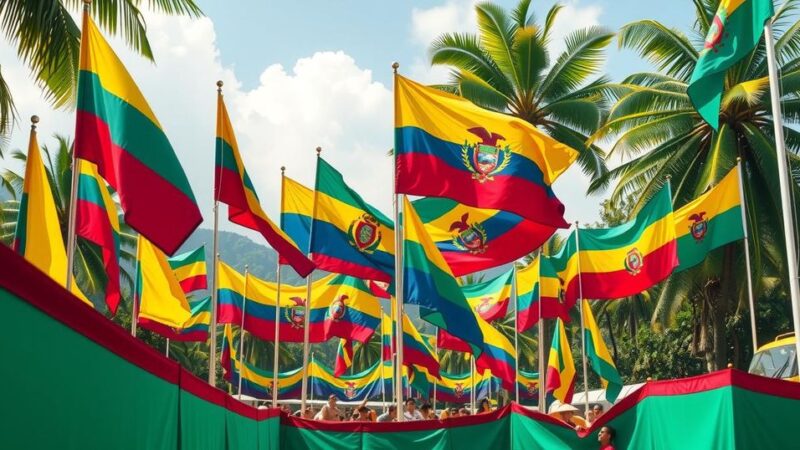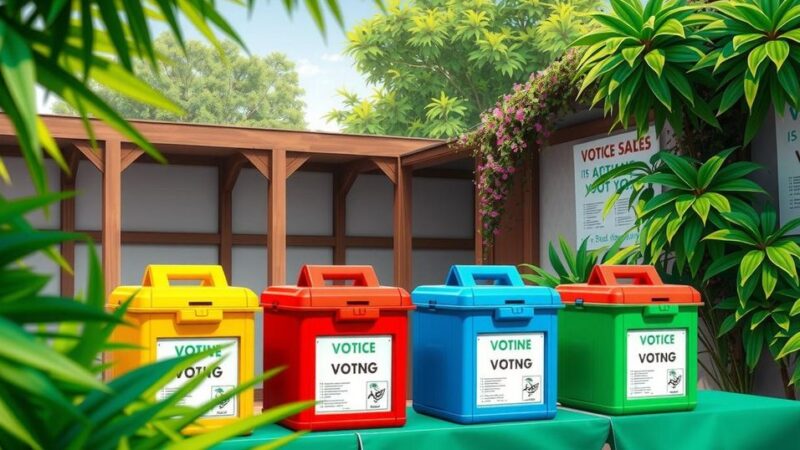Somalia’s President Hassan Sheikh Mohamud survived a bomb attack that killed several of his bodyguards and civilians, including a journalist. Al-Shabaab claimed responsibility, raising concerns over intelligence capabilities. The government briefly shut down a media station and arrested several journalists covering the incident. The attack highlights ongoing security challenges as Al-Shabaab intensifies its campaign against the Somali government.
On Tuesday, Somalia’s President Hassan Sheikh Mohamud narrowly escaped an assassination attempt when his convoy was targeted by a powerful bomb in Mogadishu’s Ceelgaabta neighborhood. The explosion resulted in the deaths of numerous bodyguards and civilians, including a journalist. Eyewitnesses reported that the bomb, concealed on the roadside, detonated as the presidential entourage passed a security checkpoint, damaging one of the vehicles and causing significant structural damage to nearby buildings.
A total of at least ten individuals were confirmed dead, including President Mohamud’s bodyguards and journalist Mohamed Abukar Dabaashe, as stated by the Somali Journalists Syndicate. The attack transpired while the president was heading to the frontlines to bolster efforts against the advancing Al-Shabaab militants. The group subsequently took responsibility for the attack, raising alarm over their capacity to launch such brazen assaults amidst perceived weaknesses in the Somali government’s intelligence.
Following the incident, National Security Advisor Hussein Sheikh Ali reassured the public via social media that “The president is safe and on travel to oversee the offensive against Shabaab in the regions by the Somali National Army.” The Somali Ministry of Information confirmed that the attack targeted the president’s convoy while he was heading to support military operations.
The UK Embassy in Mogadishu condemned the attack, labeling it a “cowardly act” and expressing condolences for the victims. Their statement emphasized the UK’s commitment to supporting the Somali government in combating extremist violence.
In a related development, armed police forces stormed the Risaala Media station, shutting it down and arresting its journalists who were covering the bombing incident. This follows the prior detention of 17 additional journalists at the bombing scene, who were reportedly released after having their footage erased by authorities.
This attack occurred following a U.S. Embassy alert regarding imminent threats in Somalia, specifically in Mogadishu, while Al-Shabaab has also intensified its military activities in the region, aiming to control Mogadishu by June. Recent developments indicate further territorial advances by Al-Shabaab, strengthening their influence near the capital.
The attempt on President Mohamud’s life and the subsequent media shutdown highlight ongoing insecurity in Somalia and the government’s struggle against insurgent forces. The escalation of violence poses significant challenges for authorities tasked with maintaining order and protecting civilians against militant threats.
The attempted bombing on President Hassan Sheikh Mohamud underscores the ongoing security challenges in Somalia posed by the Al-Shabaab militant group. The incident resulted in significant casualties among both government personnel and civilians, igniting critical discussions on media freedoms amid government crackdowns following the attack. The response from the international community reflects growing concern regarding escalation in violence, emphasizing the need for improved security measures and a united front against extremist threats in the region.
Original Source: hornobserver.com






